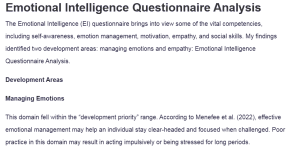Emotional Intelligence Questionnaire Analysis
The Emotional Intelligence (EI) questionnaire brings into view some of the vital competencies, including self-awareness, emotion management, motivation, empathy, and social skills. My findings identified two development areas: managing emotions and empathy: Emotional Intelligence Questionnaire Analysis.
Development Areas
Managing Emotions
This domain fell within the “development priority” range. According to Menefee et al. (2022), effective emotional management may help an individual stay clear-headed and focused when challenged. Poor practice in this domain may result in acting impulsively or being stressed for long periods.
An immediate action that could be developed would be to practice mindfulness techniques. Mindfulness techniques include deep breathing exercises or guided meditation that could enhance emotional regulation through increased present-moment awareness and reduced reactive behavior.
Empathy
Empathy followed suit in the category of “needs attention.” This is one of those competencies that entails comprehension and a response to the feelings displayed by others, which makes it an essential ingredient of good interpersonal relationships. According to Vilella and Reddivari (2021), I want to improve my empathy through active listening exercises. Precisely, I will intentionally listen to the perspectives of others and validate their emotions in order to connect with the feelings of other people.
EI’s Impact on Nursing Skills Development
Emotional intelligence as a nursing student significantly affects professional development and quality delivery of patient services. Firstly, awareness and management of one’s emotions allow for a controlled response in high-pressure situations. Many incidents on the nursing job are emotionally charged; therefore, understanding one’s feelings makes one’s decision patient-centered and free from biases, according to Luna et al. (2021). Besides, emotion management reduces resultant burnout; hence, this contributes to mental well-being and good career performance.
The roots of patient care and teamwork blossom from empathy and social skills. The consequences of understanding feelings are those that will lead to confidence in sharing even very crucial health information. In fact, Dietl et al. (2023) elaborate that efficient cooperation with colleagues includes observing and mimicking various conditions of communication and emotional state. For instance, assurance through showing empathy to a disturbed patient or relative adds beauty to caregiving.
Motivation is another ingredient of EI, which enables a student to work through academic and clinical struggles. Building intrinsic motivation will support staying focused on such long-term objectives as excelling in patient care or achieving professional milestones.
Conclusion
I will enhance my EI and nursing competencies by infusing mindfulness into my emotional management and engaging in empathy-building activities. These steps lead me toward my goal of offering holistic care and building meaningful relationships that guarantee professional and personal success in the nursing field.
References
Dietl, J. E., Derksen, C., Keller, F. M., & Lippke, S. (2023). Interdisciplinary and Interprofessional Communication intervention: How Psychological Safety Fosters Communication and Increases Patient Safety. Frontiers in Psychology, 14(14). https://doi.org/10.3389/fpsyg.2023.1164288
Luna, L. M. B., Vilar, M. M., Soto, C. M., & Santiago, J. L. C. (2021). Emotional Intelligence Measures: a Systematic Review. Healthcare, 9(12), 1696. https://doi.org/10.3390/healthcare9121696
Menefee, D. S., Ledoux, T., & Johnston, C. A. (2022). The Importance of Emotional Regulation in Mental Health. American Journal of Lifestyle Medicine, 16(1), 28–31. https://doi.org/10.1177/15598276211049771
Vilella, R. C., & Reddivari, A. K. R. (2021). Empathy. PubMed; StatPearls Publishing. https://www.ncbi.nlm.nih.gov/books/NBK549810/
ORDER A PLAGIARISM-FREE PAPER HERE
We’ll write everything from scratch
Question
(complete before 1st clinical weekend) – Use of AI on this assignment prohibited
Consider the results of your EI Questionnaire. List 2 areas that fell into the “development priority” or “needs attention” categories and identify an action that you can take immediately to strengthen your emotional intelligence in that area. (100 words)
1.
2.

Emotional Intelligence Questionnaire Analysis
If you need help, the following links give some suggestions on ways to improve your EI.
https://www.simplypsychology.org/how-to-improve-emotional-intelligence.html
https://positivepsychology.com/emotional-intelligence-eq/
Consider how EI is going to impact your developing skills as a student nurse this semester (200 words).

